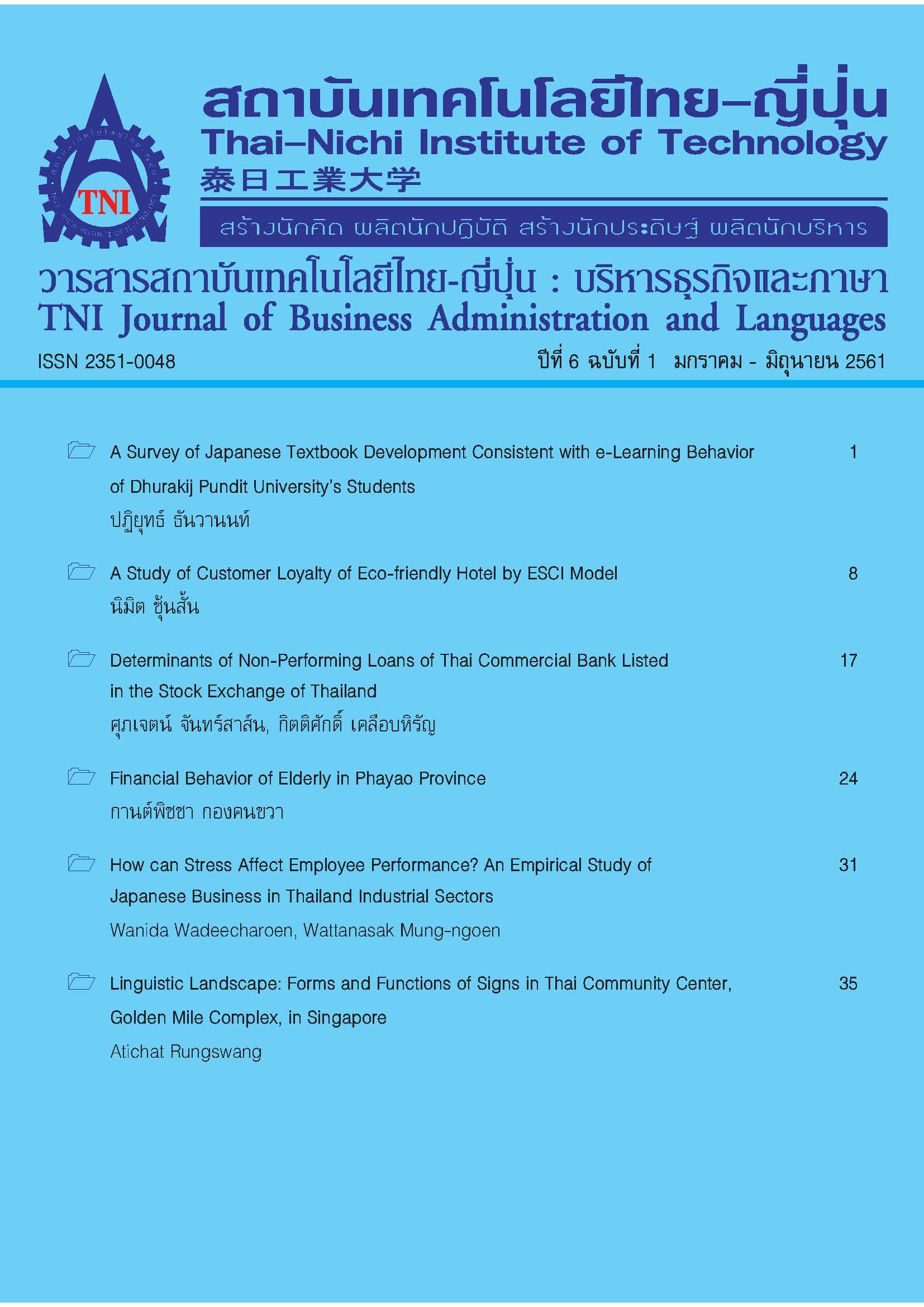A Survey of Japanese Textbook Development Consistent with e-Learning Behavior of Dhurakij Pundit University’s Students
Main Article Content
Abstract
From the statistics of the National Statistical Office found that the number of mobile phone users to access the Internet now has more likely continued increasing. In addition, ages of people who has access to internet are reduce especially people in student age. It also showed that the percentage of internet usage is very high in high school and college level compared with another people age range. The National Statistical Office also found that the number of students who learn from books currently reduced because they turned to learn from online media instead of books.
The purpose of this research is to study Japanese Language learning behavior through online media of undergraduate students in Dhurakij Pundit University. Nowadays, teaching Japanese language has become one of the most important second language that the general academic institutions give priority the same with English language. Also, behavior of young people who are student has changed from learn from books to learn from online media, which is available any time and scopes of content are unlimited.
These studies case collected data from 123 undergraduate students who had attended all Japanese language courses from Dhurakij Pundit University in the second semester year 2015. The research has found most students who learn Japanese language from online media more than book. However, when revised learning plan to align with student behavior when they use online, the students are very satisfactory.
Article Details
Article Accepting Policy
The editorial board of Thai-Nichi Institute of Technology is pleased to receive articles from lecturers and experts in the fields of business administration, languages, engineering and technology written in Thai or English. The academic work submitted for publication must not be published in any other publication before and must not be under consideration of other journal submissions. Therefore, those interested in participating in the dissemination of work and knowledge can submit their article to the editorial board for further submission to the screening committee to consider publishing in the journal. The articles that can be published include solely research articles. Interested persons can prepare their articles by reviewing recommendations for article authors.
Copyright infringement is solely the responsibility of the author(s) of the article. Articles that have been published must be screened and reviewed for quality from qualified experts approved by the editorial board.
The text that appears within each article published in this research journal is a personal opinion of each author, nothing related to Thai-Nichi Institute of Technology, and other faculty members in the institution in any way. Responsibilities and accuracy for the content of each article are owned by each author. If there is any mistake, each author will be responsible for his/her own article(s).
The editorial board reserves the right not to bring any content, views or comments of articles in the Journal of Thai-Nichi Institute of Technology to publish before receiving permission from the authorized author(s) in writing. The published work is the copyright of the Journal of Thai-Nichi Institute of Technology.
References
ใจทิพย์ ณ สงขลา, “การสอนผ่านเครือข่ายเวิลด์ไวด์เว็บ,” วารสารครุศาสตร์, ปีที่ 27, ฉบับที่ 3, หน้า 18-28, 2542.
วิชุดา รัตนเพียร, “การเรียนการสอนผ่านเว็บ ทางเลือกใหม่ของเทคโนโลยีการศึกษาไทย,”. วารสารครุศาสตร์, ปีที่ 27, ฉบับที่ 3, หน้า 29-35, 2542
คณะเศรษฐศาสตร์ จุฬาลงกรณ์มหาวิทยาลัย และ ศูนย์วิจัยเพื่อพัฒนาสังคมและธุรกิจ, รายงานผลการวิจัย เรื่อง การศึกษาพฤติกรรมการอ่านและซื้อหนังสือของคนไทย. จุฬาลงกรณ์มหาวิทยาลัย: กรุงเทพ, 2558.
ชเนตตี สยนานนท์, “พฤติกรรมและปัญหาการใช้อินเทอร์เน็ตของนักศึกษาระดับปริญญาตรี,” วิทยานิพนธ์การศึกษามหาบัณฑิต (วิชาการอุดมศึกษา), มหาวิทยาลัยศรีนครินทรวิโรฒ, กรุงเทพฯ, 2555.
พิจิตรา สิริศรีสัมพันธ์, “ทัศนะที่มีต่อการเรียนการสอนผ่านคอมพิวเตอร์บนเครือข่ายคอมพิวเตอร์ของนักศึกษาระดับปริญญาตรี มหาวิทยาลัยมหิดล,” วิทยานิพนธ์การศึกษามหาบัณฑิต (วิชาการอุดมศึกษา), มหาวิทยาลัยศรีน ครินทรวิโรฒ, กรุงเทพฯ, 2547.
ยุพกา กุชิม่า, กนกพร นุ่มทอง, และ สร้อยสุดา ณ ระนอง, “ความนิยมในการเรียนภาษาญี่ปุ่นและภาษาจีน ของนิสิตมหาวิทยาลัยเกษตรศาสตร์: แรงจูงใจแตกต่างกันอย่างไร,” วารสารญี่ปุ่นศึกษา, ปีที่ 30, ฉบับที่ 1, หน้า 27–40, 2013.
“สำรวจการมีการใช้เทคโนโลยีสารสนเทศและการสื่อสารในครัวเรือน.” สำนักงานสถิติแห่งชาติ, [ออนไลน์]. แหล่งที่มา: https://service.nso.go.th/nso/web/survey/surtec5-1-3.html. [เข้าถึงเมื่อ: 14-ก.พ.-2558].


